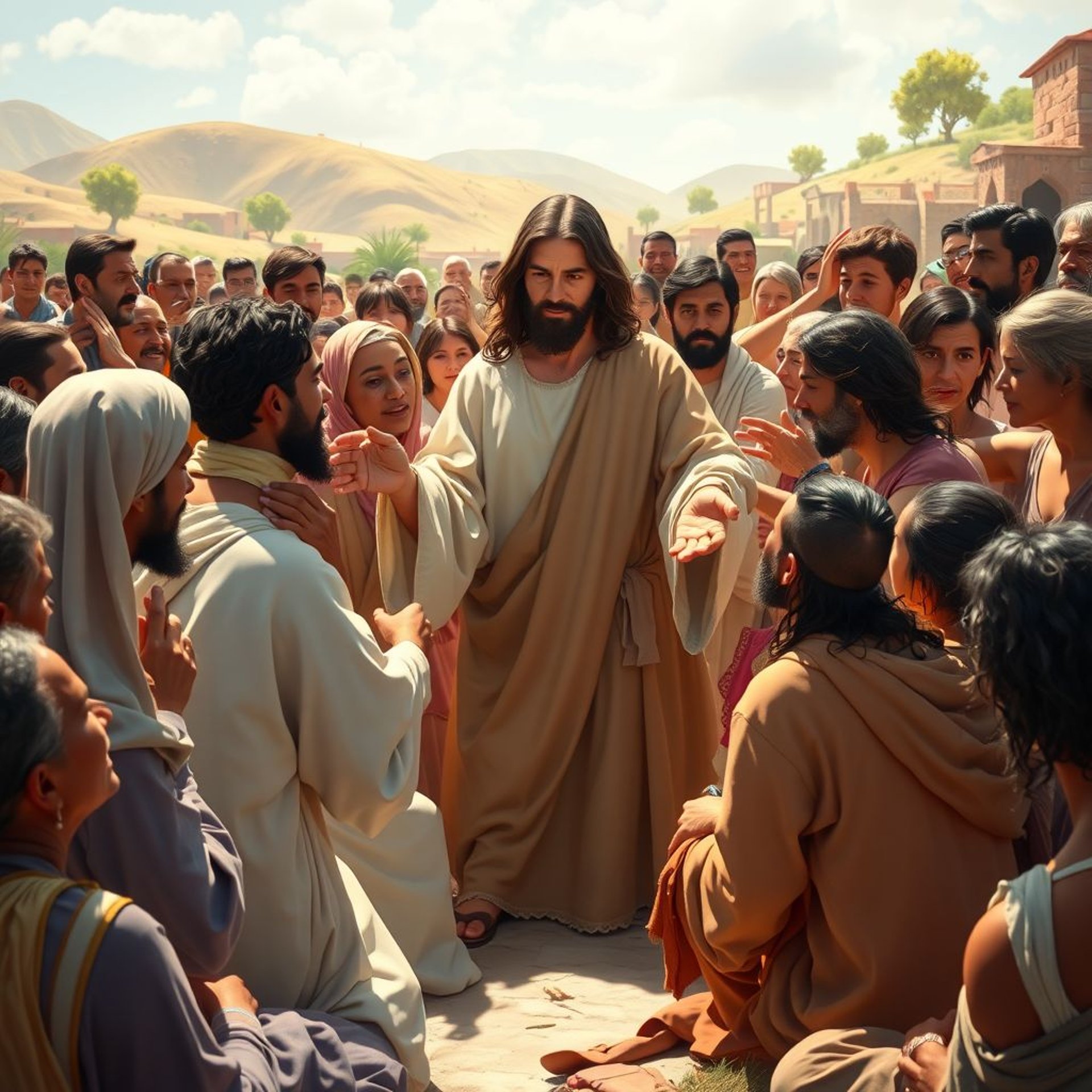
1. PARABLE OF THE UNJUST JUDGE
The parable of the unjust judge, located in Luke 18:1-8, illustrates the significance of unwavering prayer and reassures that God acknowledges and addresses the needs of His followers.
In this narrative, Jesus presents a judge characterized by his indifference to both divine authority and human welfare. In the same locality resides a widow who persistently approaches the judge, seeking justice against her opponent. Despite the judge's apathy, her relentless entreaties gradually wear him down. Ultimately, he concedes to her demands—not out of righteousness or compassion for her situation but merely to rid himself of her continuous petitions.
Following this parable, Jesus parallels the unjust judge and God. He comforts His audience by stating that if even a corrupt judge can be compelled to act through persistence, then surely God—who is just and loving—will respond to the pleas of His chosen people with even greater urgency. Jesus stresses that God will swiftly deliver justice on their behalf.
The parable wraps up with a thought-provoking question: when the Son of Man arrives, will He find faith on earth? This prompts contemplation on the vital role of enduring faith and ongoing prayer, urging believers to stay hopeful and alert even amidst challenges.
In summary, the parable underscores God's willingness to hear His people's prayers and highlights the necessity of faith and perseverance in pursuing justice and assistance. It reassures followers that their appeals do not go unnoticed and inspires them to continue seeking and trusting in God's timing and fairness.
2. PARABLE OF THE PHARISEE AND TAX COLLECTOR
The parable of the Pharisee and the tax collector, as presented in Luke 18:9-14, exemplifies humility, self-righteousness, and authentic repentance from God's perspective.
In this narrative, Jesus describes two individuals who visit the temple to pray. The first is a Pharisee, a religious authority recognized for his rigorous observance of the law, who stands proudly and prays about his righteousness. He expresses gratitude to God for not being like others—thieves, wrongdoers, or even the tax collector nearby. The Pharisee enumerates his religious achievements, such as fasting twice a week and donating a tenth of his earnings, emphasizing his belief in his moral superiority.
Conversely, the second individual is a tax collector, whom society views with contempt due to his collaboration with Roman authorities and frequent dishonesty towards fellow Jews. He keeps his distance and does not dare to raise his eyes toward heaven. Instead, he strikes his chest and pleads earnestly, “God, have mercy on me, a sinner!” His plea demonstrates true humility and an awareness of his unworthiness.
Jesus concludes the parable by asserting that the tax collector returned home justified before God rather than the Pharisee. He underscores that those who elevate themselves will be brought low while humble ones will be elevated.
This parable is a significant reminder of the value of humility and sincerity in one’s relationship with God. It critiques superficial displays of righteousness and self-satisfaction by illustrating that genuine acceptance by God arises from an honest recognition of one's faults and a sincere request for mercy. Ultimately, it conveys that God cherishes a contrite spirit more than self-righteousness.
3. PARABLE OF THE RICH MAN AND LAZARUS
The parable of the Rich Man and Lazarus, located in Luke 16:19-31, presents significant insights regarding wealth, empathy, and the outcomes stemming from one’s life choices.
In this narrative, Jesus illustrates a wealthy man who indulges in luxury daily, adorned in expensive garments and relishing abundant food. At his entrance lies a destitute man named Lazarus, afflicted with sores and yearning for the leftovers that fall from the rich man's table. Despite Lazarus’s dire situation, he receives no acknowledgment from the affluent man.
Eventually, both individuals pass away. Lazarus is taken by angels to Abraham's side, a realm of solace and peace, while the wealthy man finds himself in Hades, tormented by flames. In his agony, he sees Abraham in the distance with Lazarus beside him. He cries out for mercy from Abraham and requests that Lazarus dip his finger in water to ease his thirst; however, Abraham informs him of a vast chasm that prevents anyone from crossing over.
The rich man then implores Abraham to send Lazarus to warn his five brothers about their behavior so they can avoid similar suffering. Abraham replies that they have Moses and the Prophets for guidance; if they ignore their teachings, they would not be persuaded even if someone were to rise from the dead.
This parable explores themes of social equity and the obligations tied to wealth. It illuminates the contrasts between affluence and poverty while stressing the significance of compassion and caring for those less fortunate. Moreover, it reinforces the notion that earthly decisions influence one's eternal fate and underscores the importance of recognizing spiritual truths. Ultimately, this story serves as a poignant reminder of the ramifications of neglecting others' needs and emphasizes the necessity of paying attention to God's messages in Scripture.
4. PARABLE OF THE SHREWD MANAGER
The parable of the shrewd manager, located in Luke 16:1-13, delivers a compelling message regarding stewardship, wisdom, and the appropriate utilization of resources. In this narrative, Jesus describes a manager accused of squandering his master's assets. Confronted with the possibility of being fired, the manager understands that he must act to ensure his future stability.
Realizing his job is at stake, the manager formulates a clever strategy. He summons each debtor of his master and inquires about their outstanding debts. To one debtor, he suggests halving the amount owed, while to another, he also instructs a significant reduction. Through these actions, the manager aims to gain favor with these individuals so that they will accept him into their homes when he loses his position.
Upon discovering what the manager has done, the master surprisingly praises him for his shrewdness, acknowledging that the manager wisely prepared for an uncertain future. Jesus utilizes this scenario to convey an important lesson: often, those who belong to this world are more astute in their dealings than those who are considered children of light.
He underscores the importance of being faithful to worldly wealth, teaching that individuals who demonstrate reliability in minor matters will also be dependable in larger ones. Additionally, Jesus emphasizes that it is impossible to simultaneously serve God and money, advocating for devotion to God above all else.
This parable encourages listeners to act wisely and judiciously while reflecting on how they manage their resources. It highlights that material wealth should be employed in ways consistent with divine values and that one's actions should nurture relationships extending beyond earthly existence. Ultimately, it serves as a reminder to value spiritual richness over material possessions.
5. PARABLE OF THE WINE SELLER
The parable of the wine seller, as presented in Luke 5:36-39, underscores the idea of new beginnings and the transformative essence of Jesus' teachings in contrast to established religious customs. In this narrative, Jesus employs the metaphor of wineskins to communicate His point effectively.
He starts by illustrating that nobody sews a new patch onto an old garment; if they do, the new fabric will detach from the old material, resulting in a more significant tear. He further clarifies that pouring new wine into old wineskins is equally unwise. If one attempts this, the fermentation process will cause the old skins to rupture due to expansion. Instead, placing new wine into fresh wineskins is essential to preserve both.
This parable highlights that Jesus' presence and the principles of the Kingdom of God represent a novel covenant that cannot merely be integrated into outdated religious frameworks. The Pharisees and other religious authorities were often inflexible in their commitment to tradition, while Jesus advocated for a renewed interpretation of faith that surpasses conventional boundaries.
Moreover, the concluding remark of the parable—that no one prefers new wine after tasting old because they claim the old is superior—implies that people may resist change and cling to familiar customs instead of welcoming something innovative and life-altering.
In summary, this parable encourages listeners to embrace the new life and doctrines presented by Jesus, promoting an attitude open to growth and adaptability rather than being restricted by historical traditions. It emphasizes the necessity for transformation in one's faith and highlights the significance of being receptive to God's evolving societal influence.
Parables on Justice and Morality
Contact Us


Want to know more? Our "Question and Answer" area is here to answer your questions and start important conversations.
Faith
Exploring the biblical truth and knowledge.
COMMUNITY
+55 95 98117-7630
© 2024 - 2025. All rights reserved.
Hamillton Rice Street 114 - Boa Vista- RR - BR
